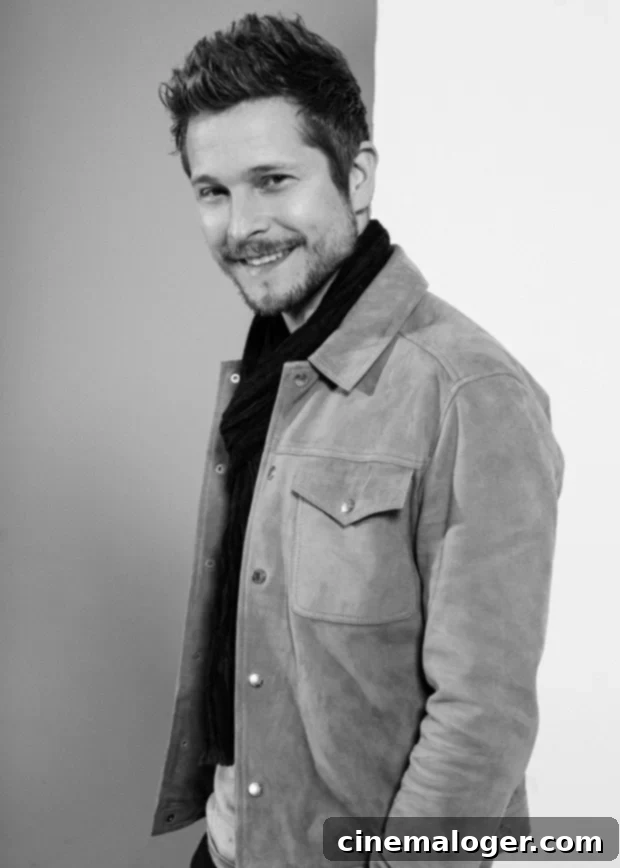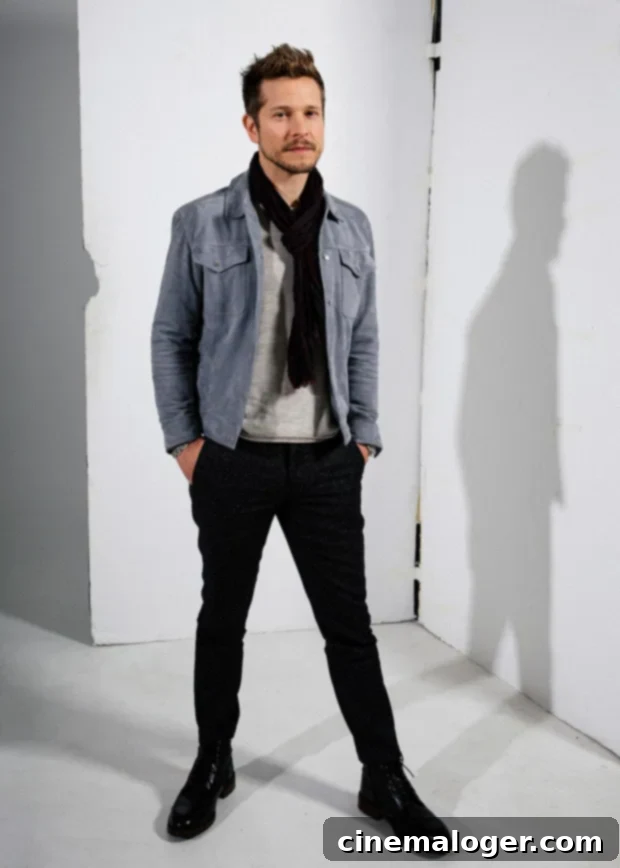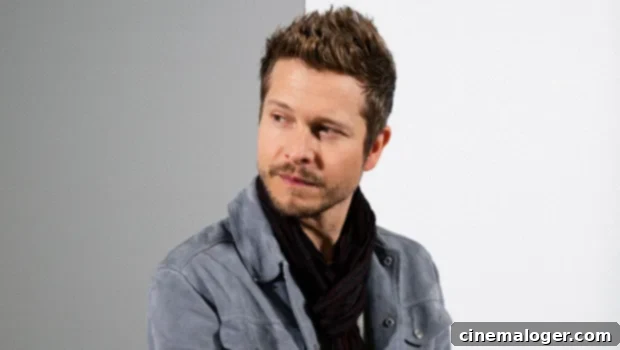Matt Czuchry Reveals Conrad’s Intense Season 3 Arc on The Resident: Red Rock, Devon, and Dr. Cain Confrontations
As the captivating medical drama The Resident progresses deep into its third season, the stakes have never been higher for Chastain Park Memorial Hospital and its dedicated, yet often conflicted, staff. The FOX series continues to distinguish itself by expertly blending compelling personal storylines with sharp critiques of the healthcare system, a formula that has resonated deeply with its growing audience. From the lingering tragedy of Jessie Nevin’s death and the unsettling mystery surrounding it, to the unsettling arrival of the formidable Dr. Cain, and the escalating tension between beloved mentors Dr. Conrad Hawkins and Dr. Devon Pravesh, Season 3 is meticulously unraveling the intricate layers of its characters and their complex professional and ethical landscapes.
Dr. Conrad Hawkins, portrayed with charismatic intensity by **Matt Czuchry**, finds himself at the epicenter of many of these converging conflicts. Czuchry recently sat down for an exclusive interview, offering invaluable insights into Conrad’s evolving journey, the intricate narrative threads propelling the series into its pivotal second half, and the profound dedication of the “fantastic” cast that strives to elevate The Resident to its highest potential.
One of the season’s most compelling dynamics revolves around the philosophical clash between Conrad and Devon. Their increasingly divergent points of view on medical practice are far more than mere dramatic fodder; they mirror real-world debates within the healthcare community. Czuchry highlighted that this intensely personal and professional storyline is designed to come “full circle” by the conclusion of the season’s first half, promising a significant resolution or pivotal turning point in their relationship. Simultaneously, Conrad and Nic Nevin’s emotionally charged investigation into Jessie’s death continues to be a central focus, its “emotional impact” a constant, poignant presence. Despite the immense pressure and grief, Czuchry reassures fans that the steadfast relationship between Conrad and Nic will remain a solid anchor amidst the unfolding chaos.
The previous episode hinted at Conrad’s audacious move to access critical files, a decision that could carry significant ramifications. Can you elaborate on the immediate aftermath of this and what lies ahead for the show? Will audiences quickly learn the outcome of his actions?
Matt Czuchry: Our show masterfully weaves serialized elements throughout each season, creating a rich tapestry of ongoing narratives. This investigative thread, particularly concerning the mysterious drug, is indeed one of those serialized components. Viewers won’t immediately discover the full consequences of Conrad accessing those files. However, that final shot from the previous episode, coupled with his earlier refusal of morphine for a patient, clearly signals that Conrad is operating at his most dangerous and determined. The adversaries he now faces—the powerful conglomerate Red Rock, which brazenly prioritizes profits over patient well-being—represent a more formidable, more entrenched challenge than anything we’ve encountered in past seasons. We’ve also seen the growing friction between Conrad and Devon, and Conrad is even experiencing disagreements from within his own professional circle. These multifaceted conflicts are integral throughlines that will propel us through the first crucial half of this season.
Building on that, the conversation between Conrad and Devon last week was particularly fascinating. Their dynamic has long been that of student and teacher, but now the student appears to be charting his own course. What can you share about their evolving relationship, and do you believe Conrad genuinely respects Devon’s viewpoint?
Matt Czuchry: Both Conrad and Devon possess distinct and deeply held points of view regarding medical practice, and this fundamental difference allows our storytelling to explore these contrasting perspectives in a nuanced way. It forces the audience to ponder: Is Conrad pushing boundaries too far, or is his radical approach necessary? Conrad has always been the archetype of a doctor willing to bend—or even break—the rules for the perceived greater good of his patients. At this specific juncture in the series, Devon is markedly reluctant to deviate from established protocols. This inherent tension creates compelling ethical and moral dilemmas, inviting our audience members to actively decide which “side” they align with, so to speak. This pivotal relationship and its accompanying conflicts will evolve in intriguing ways throughout these initial ten episodes we’ve filmed. The interwoven narratives of Red Rock, the investigative arc surrounding the drug hemopoietin, the intricate relationship between Conrad and Devon, and Conrad’s consistently Machiavellian yet principled approach—all converge to fuel the serialized elements that define this first part of Season 3, culminating in episode ten, which we’ve just completed.
The evolving dynamic between Devon and Conrad truly resonates as a reflection of real-life medical scenarios. It’s common for doctors and residents to hold differing opinions on patient care and best practices. This feels incredibly authentic to the medical profession.
Matt Czuchry: Absolutely, that’s precisely the truth we aim to convey. I recall a friend who was pregnant and experienced some complications; she consulted five different doctors who presented three distinct opinions. This phenomenon, which I’ve extensively learned about through our show’s research, is a very real aspect of the healthcare community. Major medical decisions are far from a perfect science; often, clinicians must rely on their instincts and intuition. For Conrad, he is a character driven by a deep conviction to break what he perceives as antiquated or patient-detrimental rules for the greater good. In his mind, certain protocols are not designed to benefit the patient, and he is therefore willing to diverge from conventional wisdom. Naturally, Conrad has always sought to impart his seasoned wisdom upon Devon. However, at this particular moment in the series, Devon is assertively striving to forge his own independent path. These contrasting opinions are an authentic portrayal of what transpires within the complex healthcare system, among doctors and nurses, and ultimately impacts patients. As a patient, one might expect a straightforward process: “Here are the symptoms, here’s the diagnosis, follow these instructions, and you’ll be well.” But my research for The Resident has revealed that it simply doesn’t work that way. This authenticity, these nuanced ethical and moral dilemmas, and the spotlight on diverse points of view are, for me, some of the most exciting and compelling aspects of our show’s narrative.
It’s been a bit disheartening to see them at odds, especially given their journey from the start of the show. Their evolution has been quite remarkable.
Matt Czuchry: Episode ten truly marks a significant “full circle” moment for these two characters, harkening back to their initial interactions in the pilot. The progression of Conrad and Devon’s relationship across these ten episodes is a key serialized element of the season. Episode ten, in particular, was incredibly powerful for numerous reasons that I unfortunately cannot disclose at this moment. However, I am confident that long-time fans who have diligently watched every episode will keenly observe the profound changes in both characters, noting their transformation from their dynamic in the pilot to their current state in Season 3, episode ten. I sincerely hope this resonates with our audience—that they recognize the growth and evolution in their relationship, the maturation of their perspectives on medicine, and how this culminates in a satisfying completion of the journey we embarked on in the pilot.
Conrad and Nic’s ongoing investigation into Jessie’s death is navigating incredibly complicated emotional and ethical territory. What can you hint at regarding their relationship as they press forward with this intense inquiry, one that holds the potential for so many answers about Jessie and perhaps, ultimately, a sense of closure?
Matt Czuchry: I believe Conrad and Nic are currently in the strongest, most stable place they’ve ever been in their relationship, symbolized by their decision to move in together and even acquire chickens. This timing feels incredibly poignant, allowing them to be closer than ever as they grapple with Jessie’s tragic passing and the unsettling possibility that various elements might be interconnected. They serve as unwavering pillars of support for one another, and viewers will undoubtedly witness the profound emotional impact Jessie’s absence continues to have on both characters throughout these initial ten episodes. Specifically, we have a special Thanksgiving-themed episode this year that features a beautiful, resonant moment between Conrad and Nic, directly related to Jessie. This scene powerfully captures some of the raw challenges and complexities one faces when grieving a lost loved one. There’s a deeply woven connection intertwining Jessie, Conrad, and Nic that I believe fans will truly appreciate. Throughout these difficult times, Conrad and Nic will consistently offer each other unwavering support—a dynamic that will be particularly highlighted in the Thanksgiving episode.
Your chemistry with Emily VanCamp is exceptional. I particularly appreciate that with Conrad and Nic, there isn’t a manufactured love triangle; it’s simply about their bond.
Matt Czuchry: The strong chemistry between Emily and me stems from a mutual, profound respect for one another, a genuine willingness to listen to each other’s creative ideas, and a shared dedication to achieving the absolute best outcome for every scene we perform together. At this moment in the series, I believe both Conrad and Nic genuinely desire to reside in this space of stability and happiness, confident in their unwavering support for each other, especially as they process Jessie’s loss. It’s a space the audience hasn’t deeply explored with them before, making it uniquely compelling. Our challenge lies in finding the precise balance of allowing them to inhabit this new, more settled dynamic while discerning the right moments to further progress their relationship, in any direction that feels authentic. With Conrad and Nic, Emily, the writers, and I are committed to portraying a relationship grounded in a realism not often seen on television. While the conflict surrounding Jessie undeniably connects and challenges them, our primary aim is to depict two people who, at this specific point in their lives, genuinely get along well and are profoundly there for each other. What does that look like on screen? Often, television shies away from such portrayals because a lack of overt conflict or high drama can sometimes lead to viewer disengagement. However, we are working diligently to keep their relationship grounded and compelling. We weave in darker, more emotionally intense moments linked to Jessie’s storyline, alongside lighter, more everyday instances—like at the beginning of Season 3, discussing socks or Nic’s eating habits. We continuously strive to strike this crucial balance between the joyful, mundane aspects of their life and the profound, real-life challenges they confront. I must give a resounding shout-out to Emily, the incredible work of the writers, their open collaboration, and the consistently brilliant material they deliver. If there’s one message I could convey in this entire interview, it’s about the pervasive collaborative spirit that has defined this show from its inception through these three seasons—a spirit shared by the writers, the cast, and the entire crew. I want fans to understand that it takes an immense collective effort to produce a television show, and the very essence of The Resident is built on this collaborative energy. In many ways, I believe this shared commitment is precisely what has made these on-screen relationships feel more authentic, richly layered, and spontaneously real than they might otherwise be.


The show’s meticulous attention to detail is truly impressive, particularly evident in how narratives come full circle. Last week, when Dr. Bell passed out and awoke, his immediate instinct was to check for feeling in his hands. This felt like a subtle, yet significant, callback to his hand tremor from the first season—a brilliant nod to dedicated fans who’ve watched from the very beginning.
Matt Czuchry: Bruce Greenwood is truly an exceptional actor, and honestly, he was one of the primary reasons I was so drawn to joining this show. He had already signed on before I did. At the time the pilot script came my way, I was deeply engrossed in watching the O.J. Simpson series he was in. I remember thinking, “This feels like a bit of kismet. Here’s Bruce, an actor I’ve admired for so long, whose work I’m currently captivated by.” I was on episode five of that series when I learned he was already attached to The Resident. That connection was a huge factor in my decision to commit. And yes, I absolutely noticed that precise moment you’re referring to, with his hand. It’s a testament to his fantastic acting. In fact, the entire cast is simply phenomenal. Every single person invests so much time, passion, and genuine love into their craft. You see it in every scene, and it’s reflected in the incredible chemistry we share, not just as actors, but as people. Everyone is genuinely striving to deliver the highest possible quality for every season, every episode, every single day we’re on set. From Emily VanCamp and Malcolm-Jamal Warner, to Shaunette Renée Wilson, Manish Dayal, Morris Chestnut, Jane Leeves, and Bruce Greenwood, as well as Melina Kanakaredes from past seasons, and even actors like Tasso Feldman, who plays Irving, and Jessica Miesel, who portrays Jessica—every single individual contributes to the extraordinary quality of this show.
We haven’t yet seen extensive direct interactions between Conrad and Dr. Cain, though we’ve witnessed Cain’s confrontational style in his clashes with Kit, which were anything but pleasant. Is it inevitable that Conrad and Cain will eventually find themselves butting heads in a major way?
Matt Czuchry: Yes. Absolutely. Their paths are destined to cross, and they will clash in a very significant manner. Both Conrad and Cain are inherently headstrong individuals, possessing strong wills and deeply ingrained convictions, albeit often opposing ones. When these two powerful forces collide, it will undoubtedly have profound ramifications, not only for the trajectory of the first half of the season but also for where the narrative leads us into the subsequent half. Given their distinct personalities and professional philosophies, it’s not just expected that they will butt heads; it’s unavoidable. And I can assure you, the consequences of their inevitable confrontation will indeed be monumental for Chastain Park Memorial Hospital and its entire staff.
